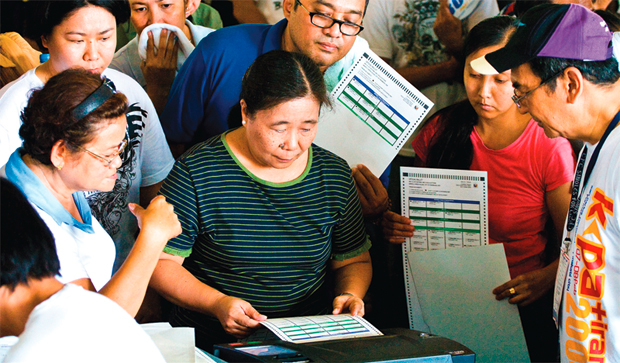DAYS BEFORE the May 10 polls, the automated election system seemed to be tamper-proof. As candidates hungry for the win could no longer cheat through ballot-shaving, switching and ballot box stealing, they resorted to massive vote buying.
It happened everywhere in the country, with candidates giving money, groceries and appliances and sample ballots or envelopes with their names.
Vote buying, according to the The Omnibus Election Code, is the act of “giving, offering or promising money or anything of value… directly or indirectly…to any person, association, corporation, entity, or community in order to induce anyone…to vote for or against any candidate or withhold his vote in the election…”
Section 264 of the same code states that those guilty of the said offense shall face imprisonment of at least one year and not more than six years. Offenders can no longer run for any position in the government or vote in any succeeding election.
Despite these penalties, vote buying continued to persist during the automated election. “Many of our voters commoditize their votes because it brings more immediate benefits than voting your conscience,” said Comelec spokesperson James Jimenez.
Jimenez added that because of this economic problem, there is no direct way to prevent vote buying.
Jun Borja, a tricycle driver who worked as a poll watcher in Quezon City also added the lack of evidence as a reason why they weren’t able to catch the offenders. “That’s the only problem. We hear a lot of people say that they have been given money but it is better if you saw it with your eyes,” he said in Filipino.
Cindy*, a sophomore, said that her father who ran for office in Mindoro was a victim of vote buying.
“In our province, the [winning] politician and his cronies would pay P1000 per voter in the family. Sometimes, the payment would come in the form of rice, jetmatics [and even] cement,” she said.
She also said that her father’s opponent also used violence to prevent people from reporting the vote buying case.
“I feel that our society already treats vote-buying as a normal part of our elections, that is why reinforcement was not serious,” she pointed out.
Jimenez said that voter education could help lessen or eradicate vote buying. “Voter education… [could mold] a generation of voters who appreciate their vote so much that they won’t be willing to sell it.”
He also said that Comelec could also improve the mechanisms of reporting the crime.
“I thought that citizen journalist groups represented a glimmer of hope – a way of possibly making it easier to report vote buying operations, but…I never saw any usable report on [the operations],” he said.
However, Jimenez is still confident in the voters’ power and citizen journalism. “All we have to do is figure out how to keep the citizen journalists safe,” he said.
*Name changed to protect the individual




